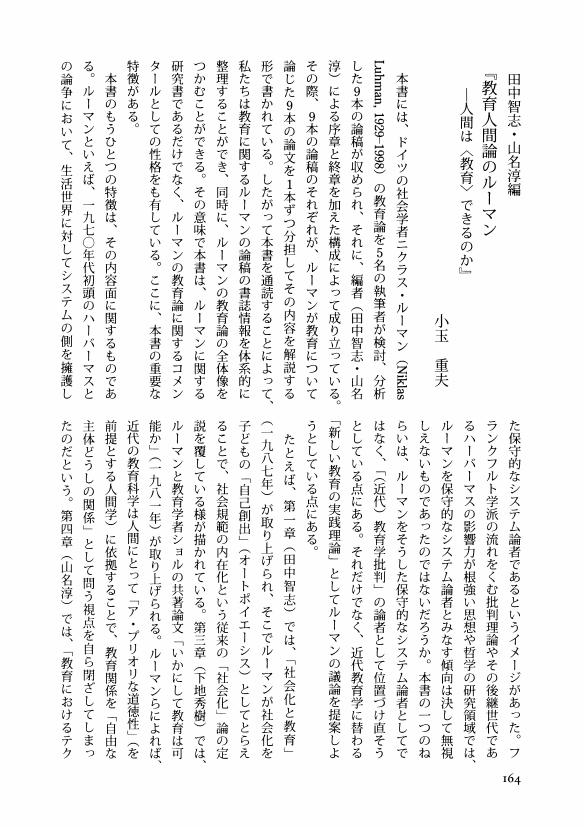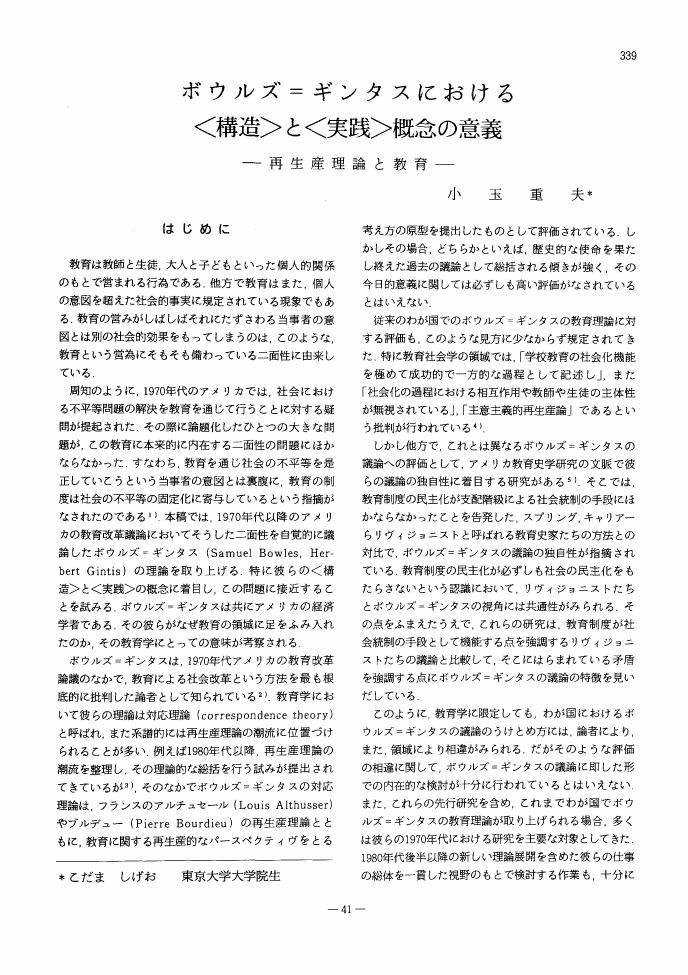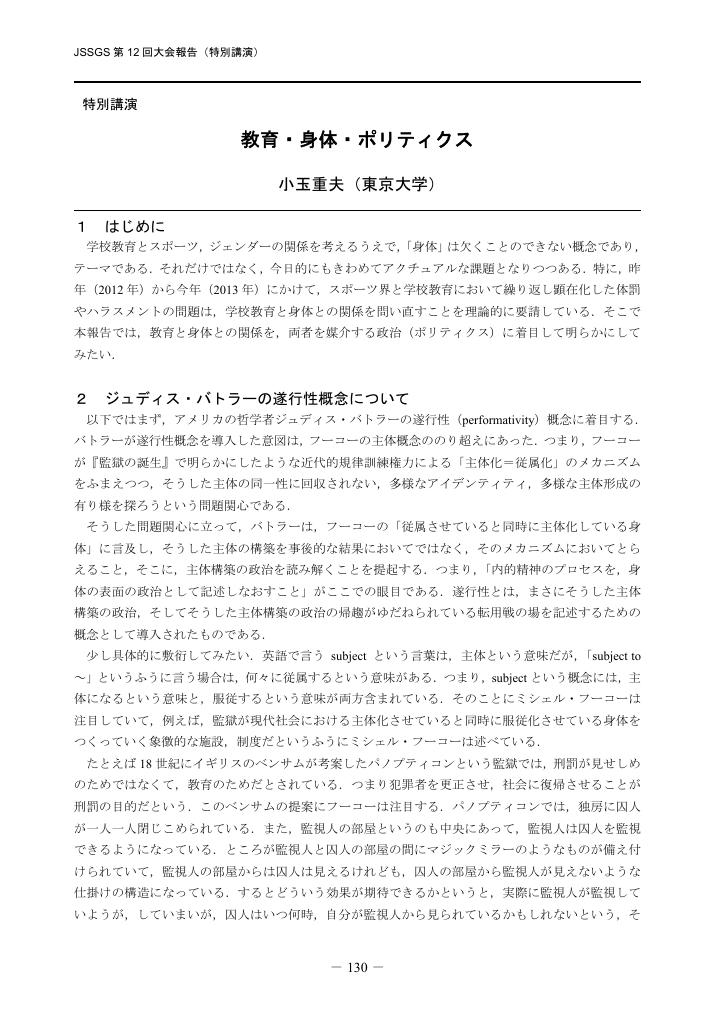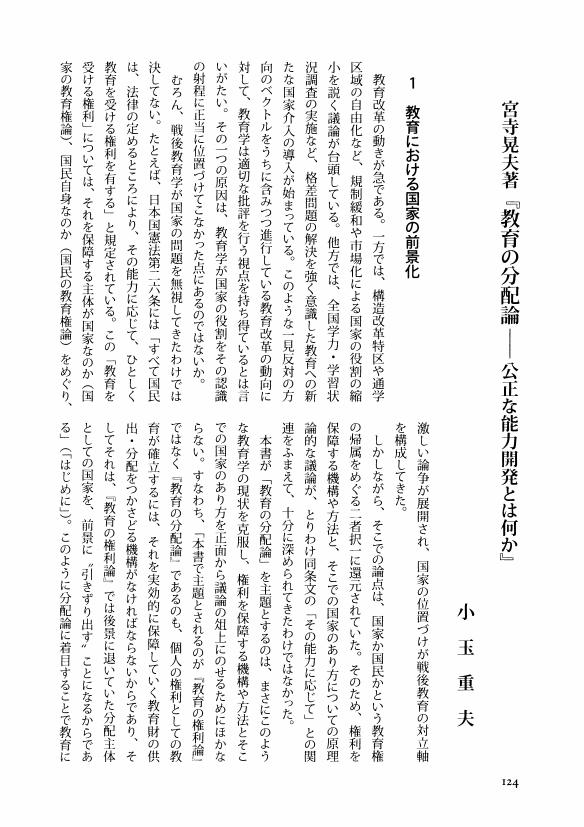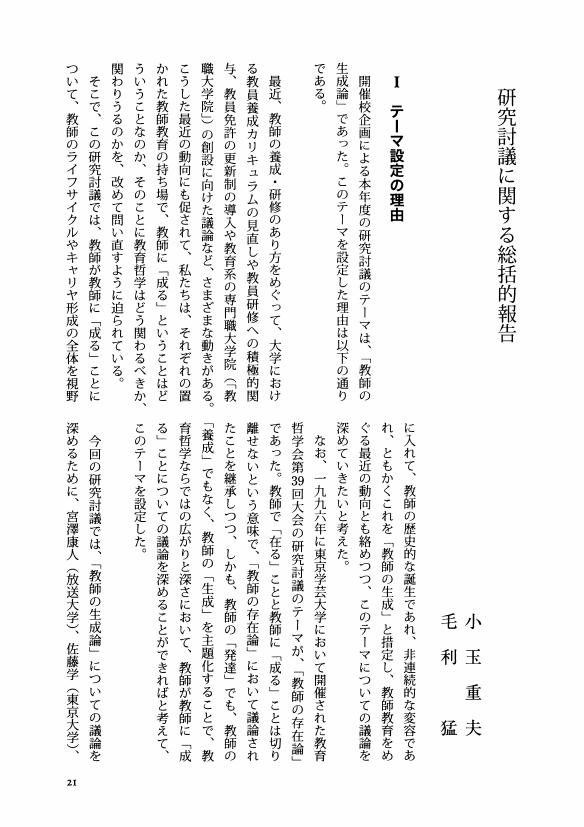4 0 0 0 OA 田中智志・山名淳編『教育人間論のルーマン-人間は〈教育〉できるのか』
- 著者
- 小玉 重夫
- 出版者
- 教育哲学会
- 雑誌
- 教育哲学研究 (ISSN:03873153)
- 巻号頁・発行日
- vol.2006, no.93, pp.164-166, 2006-05-10 (Released:2010-05-07)
- 著者
- 広田 照幸 斉藤 直子 惣脇 宏 今井 康雄 宮寺 晃夫 小玉 重夫
- 出版者
- 一般社団法人 日本教育学会
- 雑誌
- 教育学研究 (ISSN:03873161)
- 巻号頁・発行日
- vol.77, no.2, pp.195-198, 2010
3 0 0 0 OA ガバナンス改革と教育の質保証に関する理論的実証的研究
- 著者
- 大桃 敏行 秋田 喜代美 村上 祐介 勝野 正章 牧野 篤 藤村 宣之 本田 由紀 浅井 幸子 北村 友人 小玉 重夫 恒吉 僚子 小国 喜弘 李 正連 植阪 友理 市川 伸一 福留 東土 新藤 浩伸 齋藤 兆史 藤江 康彦 両角 亜希子 高橋 史子 星野 崇宏 伊藤 秀樹 山本 清 吉良 直 星野 崇宏 伊藤 秀樹
- 出版者
- 東京大学
- 雑誌
- 基盤研究(A)
- 巻号頁・発行日
- 2014-04-01
日本を含めて多くの国で多様化や競争、成果に対するアカウンタビリティを重視するガバナンス改革が行われてきた。また同時に、単なる知識や技能の習得からそれらを活用する力や課題解決力、コミュニケーション能力などの育成に向けた教育の質の転換の必要性に関する議論が展開されてきた。本研究の目的はガバナンス改革と教育の質保証との関係を検討しようとするものであり、成果志向の改革では、広い能力概念に基づく教育において評価がどこまでまたどのように用いられるのかが重要な課題となってきていることなどを示した。
- 著者
- 小玉 重夫
- 出版者
- 一般社団法人 日本教育学会
- 雑誌
- 教育学研究 (ISSN:03873161)
- 巻号頁・発行日
- vol.76, no.4, pp.412-423, 2009
1990年代以降の教育改革において「説明責任」とならんで重要な概念として浮上してきた「遂行性」は、学校や教師をアイデンティティの不安へと追い込み、シニシズムをもたらしつつある反面、多様なアイデンティティの構築可能性を含む「転用戦の場」でもある。さらに、遂行性にはらまれている「アイデンティティの固定化」という限界を超えるためには、遂行性を宙づりにしつつ、廃棄、刷新することを可能にする遂行中断性が重要である。この遂行中断性に、新しい教育政治学の条件を見いだすことができる。
3 0 0 0 OA 教師文化のオートポイエシス : 小中学校教師調査の結果から(IV-4部会 教師(2))
- 著者
- 小玉 重夫
- 出版者
- 教育思想史学会
- 雑誌
- 近代教育フォーラム (ISSN:09196560)
- 巻号頁・発行日
- vol.15, pp.89-102, 2006-09-17 (Released:2017-08-10)
グローバリゼーションが国民国家にかわる新たな政治社会の構成原理をもたらすのかどうか、もしそうだとすればその条件は何なのか。本稿では、アンソニー・ギデンズ、ハート=ネグリ、ジョルジョ・アガンベンの3者の思想に注目し、この問題を検討した。まず、ギデンズは、「第三の道」において旧式の福祉国家とは異なる包含のシナリオに定位した議論を提起した。だが、それは包含と排除のアポリアを顕在化させるものであった。これに対して、ハート=ネグリとアガンベンは、包含と排除の機制を見据え、マルチチュードとホモ・サケルという、対照的な議論を展開した。ハート=ネグリの場合は、マルチチュードの構成的権力によって包含/排除の境界線を反転させる構想を提起した。それに対してアガンベンは、構成的権力と主権権力の間の危うい偶然的な関係に依拠した政治を構想することによって、包含/排除の境界線それ自体を無化しようとした。アガンベンの議論は、潜勢力(可能性)と現勢力(現実)との間の必然的なつながりを否定する労働価値説批判としての側面をもつており、この方向で政治教育の復権を模索することが、グローバリゼーション下における新しいシティズンシップを探求するうえでの一つの鍵となることを明らかにした。
2 0 0 0 OA 公教育の構造変容
- 著者
- 小玉 重夫
- 出版者
- 日本教育社会学会
- 雑誌
- 教育社会学研究 (ISSN:03873145)
- 巻号頁・発行日
- vol.70, pp.21-38, 2002-05-15 (Released:2011-03-18)
- 参考文献数
- 26
- 被引用文献数
- 2 1
The 1990s were a turning point in world history; as Eric Hobsbawm wrote in his recent book, the “short twentieth century” ended in the early 1990s. With regard to public education, not only in Europe and North America, but in Japan as well, the structure of the public education system underwent dramatic change during the 1990s.In this paper I examine the characteristics of this change. The dominant feature of the change in the 1990s has often been conceptualized as “liberalization, ” or the “deregulation” or “marketization” of public education. However, this conceptualization does not adequately grasp the political aspect of the change, as Chantal Mouffe demonstrated when she termed it “the return of the political, ” or Nancy Fraser when she called the dilemma of justice in a “post-socialist” age one that was moving “from redistribution to recognition.” Focusing on this political aspect of the change in public education in the 1990s, I clarify the specificity of the historical context of this change.As in the Western countries, opportunities for public education in Japan expanded to all areas of society during the 1960s. There was, however, an important difference in the characteristics of this expansion between the West and Japan. In the West, it was initiated by the policy of the welfare state. In Japan, by contrast, the role of the welfare state was less important, and was replaced by the depoliticized triangle of family, school, and private enterprise.In the 1990s, Japan experienced major social and political upheavals. The “bubble economy, ” which had prevented the manifestation of economic crisis, burst in the early years of the decade. The depoliticized triangle of family, school, and private enterprise, which had replaced the welfare state, fell into a crisis of legitimacy.It was at this point that the triangle began to break down, and the need arose for an alternative to it. In this situation, the actual possibility emerged of a return of “the political.” In order to seek this possibility, it is necessary to reconstruct the space of political significance as well as democratic citizenship. The task of public education here should be focused on political life, which is, as Giorgio Agamben cited, to be distinguished from biological life. This is one of the most important points in the restructuring of public education.
2 0 0 0 OA ボウルズ=ギンタスにおける<構造>と<実践>概念の意義再生産理論と教育
- 著者
- 小玉 重夫
- 出版者
- 一般社団法人 日本教育学会
- 雑誌
- 教育学研究 (ISSN:03873161)
- 巻号頁・発行日
- vol.58, no.4, pp.339-348, 1991-12-30 (Released:2009-01-13)
- 参考文献数
- 58
2 0 0 0 OA 千葉雅也氏講演会「部分的な無関心について」の報告
- 著者
- 小玉 重夫
- 出版者
- 東京大学大学院教育学研究科基礎教育学研究室
- 雑誌
- 研究室紀要 (ISSN:02857766)
- 巻号頁・発行日
- vol.39, pp.153-155, 2013-09
講演会記録
1 0 0 0 OA ポストトゥルースの時代における教育と政治 : よみがえる亡霊、来たるべき市民
- 著者
- 小玉 重夫
- 出版者
- 教育思想史学会
- 雑誌
- 近代教育フォーラム (ISSN:09196560)
- 巻号頁・発行日
- vol.27, pp.31-38, 2018 (Released:2019-09-07)
1 0 0 0 OA 市民性形成と言語文化教育 価値観の異なる多様な人たちと共に生きるために
- 著者
- オードリー オスラー 小玉 重夫 細川 英雄 福島 青史
- 出版者
- 言語文化教育研究学会:ALCE
- 雑誌
- 言語文化教育研究 (ISSN:21889600)
- 巻号頁・発行日
- vol.17, pp.2-32, 2019-12-31 (Released:2020-03-10)
本稿は,2019年3月10日に早稲田大学で開催された言語文化教育研究学会第5回年次大会シンポジウムの記録である。
- 著者
- 小玉 重夫
- 出版者
- 教育思想史学会
- 雑誌
- 近代教育フォーラム (ISSN:09196560)
- 巻号頁・発行日
- vol.15, pp.89-102, 2006
グローバリゼーションが国民国家にかわる新たな政治社会の構成原理をもたらすのかどうか、もしそうだとすればその条件は何なのか。本稿では、アンソニー・ギデンズ、ハート=ネグリ、ジョルジョ・アガンベンの3者の思想に注目し、この問題を検討した。まず、ギデンズは、「第三の道」において旧式の福祉国家とは異なる包含のシナリオに定位した議論を提起した。だが、それは包含と排除のアポリアを顕在化させるものであった。これに対して、ハート=ネグリとアガンベンは、包含と排除の機制を見据え、マルチチュードとホモ・サケルという、対照的な議論を展開した。ハート=ネグリの場合は、マルチチュードの構成的権力によって包含/排除の境界線を反転させる構想を提起した。それに対してアガンベンは、構成的権力と主権権力の間の危うい偶然的な関係に依拠した政治を構想することによって、包含/排除の境界線それ自体を無化しようとした。アガンベンの議論は、潜勢力(可能性)と現勢力(現実)との間の必然的なつながりを否定する労働価値説批判としての側面をもつており、この方向で政治教育の復権を模索することが、グローバリゼーション下における新しいシティズンシップを探求するうえでの一つの鍵となることを明らかにした。
1 0 0 0 OA 教育・身体・ポリティクス
- 著者
- 小玉 重夫
- 出版者
- 日本スポーツとジェンダー学会
- 雑誌
- スポーツとジェンダー研究 (ISSN:13482157)
- 巻号頁・発行日
- vol.12, pp.130-136, 2014 (Released:2017-04-28)
- 参考文献数
- 5
- 被引用文献数
- 1
1 0 0 0 OA 教育はなぜ脱政治化してきたか ―戦後史における1950年代の再検討―
- 著者
- 小玉 重夫 荻原 克男 村上 祐介
- 出版者
- 日本政治学会
- 雑誌
- 年報政治学 (ISSN:05494192)
- 巻号頁・発行日
- vol.67, no.1, pp.1_31-1_52, 2016 (Released:2019-06-10)
これまでの政治学・教育学では, 1950年代を教育において文部省対日教組による保革のイデオロギー対立が激化した時期であると捉えることが一般的であった。それに対し本論は, そうした表面上のイデオロギー対立が注目される中で, その底流ではこの時期に教育の脱政治化が進行していったことに焦点を当てて, 教育行財政の制度と地方教育行政の実態がむしろ脱政治化へと向かったことを歴史的な検証から明らかにすると同時に, 教育行財政の制度・実態だけでなく, 現場の教育実践のレベルにおいても, この時期に脱政治化の萌芽が生じてそれが進行してきたことを示した。具体的には, 教育行財政の制度面 (2節), 教育関係団体秩序の側面 (3節), そして教育運動, 教育実践の側面 (4節) から論証した。以上の作業を通じ, 1950年代の教育政治について通説とは異なる理解を提示すると同時に, 教育が政治化する陰で, 現在に至る教育の脱政治化への転換点が1950年代に埋め込まれていたことを明らかにした。
1 0 0 0 OA 宮寺晃夫著『教育の分配論-公正な能力開発とは何か』
- 著者
- 小玉 重夫
- 出版者
- 教育哲学会
- 雑誌
- 教育哲学研究 (ISSN:03873153)
- 巻号頁・発行日
- vol.2007, no.95, pp.124-129, 2007-05-10 (Released:2009-09-04)
1 0 0 0 OA 研究討議に関する総括的報告
- 著者
- 小玉 重夫 毛利 猛
- 出版者
- 教育哲学会
- 雑誌
- 教育哲学研究 (ISSN:03873153)
- 巻号頁・発行日
- vol.2006, no.93, pp.21-27, 2006-05-10 (Released:2009-09-04)
1 0 0 0 OA 宮寺晃夫著『リベラリズムの教育哲学-多様性と選択-』
- 著者
- 小玉 重夫
- 出版者
- 教育哲学会
- 雑誌
- 教育哲学研究 (ISSN:03873153)
- 巻号頁・発行日
- vol.2001, no.83, pp.92-96, 2001-05-10 (Released:2009-09-04)
1 0 0 0 OA 総括的報告
- 著者
- 今井 康雄 小玉 重夫
- 出版者
- 教育哲学会
- 雑誌
- 教育哲学研究 (ISSN:03873153)
- 巻号頁・発行日
- vol.2001, no.83, pp.38-42, 2001-05-10 (Released:2009-09-04)
1 0 0 0 OA 学校は、今何が出来るか 公共性の構築へ向けて
- 著者
- 小玉 重夫
- 出版者
- 教育哲学会
- 雑誌
- 教育哲学研究 (ISSN:03873153)
- 巻号頁・発行日
- vol.1999, no.79, pp.22-27, 1999-05-10 (Released:2010-05-07)
- 参考文献数
- 15
1 0 0 0 OA ハンナ・アレントの統合教育批判 アメリカ合衆国における公民権問題の文脈で
- 著者
- 小玉 重夫
- 出版者
- 教育哲学会
- 雑誌
- 教育哲学研究 (ISSN:03873153)
- 巻号頁・発行日
- vol.1994, no.69, pp.71-84, 1994-05-10 (Released:2009-09-04)
- 参考文献数
- 43
How we can consider the relation between diversity and integration in public education, is a very serious question in contemporary U. S. A. Hannah Arendt is one of the most important thinkers who dealt with this problem. Focusing on the context of the Civil Rights Problem in the 1950ies, I elucidate her critical thought on integrated education. In doing so, I try to draw out the specific viewpoint on the public character of education which is entirely different from the liberal viewpoint.Hanna Arendt criticized the Federal decision to start integration in the public schools. For her, the validity of equality is clearly restricted to the political realm. Hence, equality should not be extended to the social realm. She also warned that, by abolishing the authority of the adults, progressive education might implicitly deny their responsibility for the world into which they have borne their children.Her critical thought on integrated education raises an important viewpoint on the public character of education in which minorities can exist without assimilating to the dominant culture.
